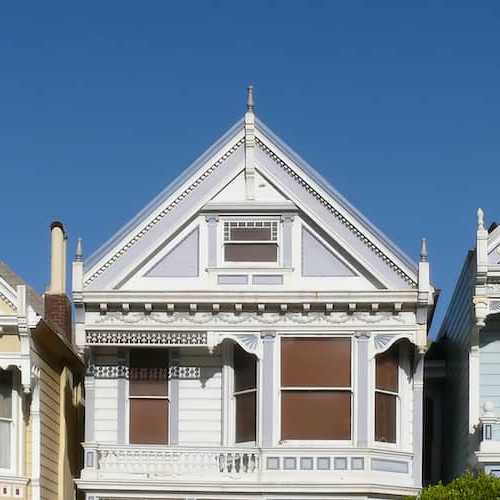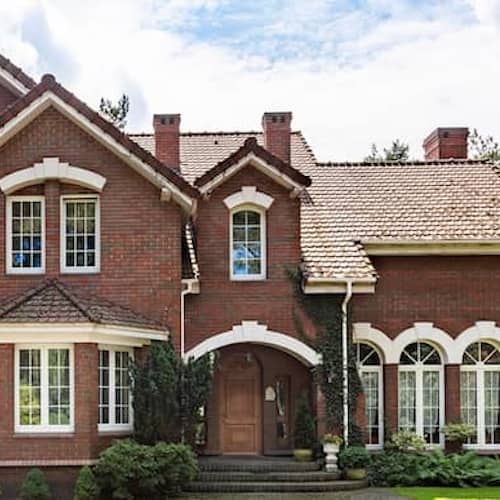What to look for when buying a house: A guide for home buyers
Contributed by Karen Idelson, Tom McLean
May 2, 2025
•9-minute read
Nothing could be more personal than house hunting. Whether it’s the neighborhood, style of home, or overall feel of the community around it, you’re choosing the place where a lot of your life will happen. You may start the process with dreams of hosting backyard barbecues, holiday dinners, or quiet game nights – all in your brand-new home. But finding your dream home will take more than imagining. Before you fall in love at the first open house you attend, there are a few things you’ll need to consider before and during your home search.
Use our checklist outlining what to look for when buying a house. We also tackle the potential influence of the housing market on home buying and red flags to watch out for as you tour homes.
10 factors to consider when buying a house
As you attend open houses, carefully assess whether a home ticks all your boxes. Here are some things to consider when buying a house as a first-time home buyer or a seasoned pro.
1. Price
For many prospective home buyers, a home’s purchase price is their biggest concern. If they overspend on a house, they run the risk of becoming house poor, spending most of their income on housing, including monthly mortgage payments. When you’re house poor, it limits your ability to spend on other essential needs or save money.
Consider getting a mortgage preapproval from your mortgage lender before you begin house shopping. The preapproval will tell you how much home you can afford and what down payment you’ll need to make. When you know these figures ahead of time, you can avoid wasting time viewing homes that are more expensive than you can afford.
2. Location
Where you buy a home will have a tremendous impact on your day-to-day life. Location is another critical factor to consider while you search for the right home. When considering a potential home, it’s important to evaluate several components of location, including:
- Flood zone. Before buying a house in a flood zone, research the area’s assigned flood zone code and assess your comfort level if the home is in a flood-prone area. And while it will likely increase your monthly expenses, you may benefit from purchasing flood insurance.
- Safety. Research the neighborhood. You can start by looking at local crime data and joining neighborhood social media groups to gain more insight into the community.
- School district. Whether you have children or not, research the local school district. Buying a house in a community with a competitive school district can be very helpful when you sell a home.
- Distance from the airport. Whether you travel repeatedly or rarely, learn how to get to your local airports from your new home. Consider the expense of ride-hailing apps and calculate how long a round trip to the airport may be.
- Public transportation. Consider your public transportation options. If you don’t drive, choosing a home close to a reliable method of public transportation, like a bus stop or subway station, may be essential.
- Noise levels. Proximity to traffic, airports, or industrial zones can be quite noisy to live by. Factor this in before you decide to buy your house.
3. House size
Carefully consider the size and floor plan of every home you tour and whether they measure up to your needs. Some aspects of a home’s size to look at include:
- Square footage
- Overall layout
- Number of bedrooms
- Number of bathrooms
- Living room size
- Whether there’s a garage, basement or attic
- Yard space
Determine which aspects are essential. Then try finding a home that meets your top requirements. A home is a major investment – do your research to establish whether it meets your basic needs.
4. Property taxes
Another factor that impacts a home’s overall affordability is property taxes. Compare property tax amounts over several years to help you calculate the overall affordability of a home. The Tax Foundation is a nonpartisan tax policy nonprofit that tracks property tax trends. It can help you analyze trends for free.
5. Homeowners association
Decide early on whether you want to live in a community tied to a homeowners association, which regulates the kinds of changes you can make to the exterior of your home and the grounds around it. Maybe you’d prefer to have greater control over what you can do with your home.
Some homes are part of a local HOA, an organization that manages a residential community. When you live in a community run by an HOA, you likely pay a fee to help maintain common areas and community amenities, and the HOA may limit what you can and can’t do with your home.
You pay HOA fees in addition to your monthly mortgage payment. You should know the amount and confirm that it fits comfortably into your budget to avoid making an offer on a home attached to an HOA with an unaffordable fee. You should also consider that HOA fees tend to increase over time.
6. Amenities
Finally, consider any community amenities you’d like access to. For example, if a home you want to buy doesn’t have a pool, you may prioritize living in a neighborhood with a public pool. If you have children, a large playground may be a priority. If lawn care isn’t your thing, buying a home in a community with a homeowners association that provides lawn maintenance may make sense.
Ultimately, amenities are nice-to-haves, not must-haves. But they can be the proverbial cherry on top that makes living in a neighborhood even more enjoyable.
7. Future resale value
Though it may seem far off, there may come a time when you want or need to sell your home. When that day comes, homeowners hope that the investment in their house pays off. Increases in home value can’t be guaranteed, but buying a home with features popular with homeowners can influence appreciation over time.
Factors that can help a home maintain or increase in value include:
- Location or neighborhood. There is an adage in the real estate community that location is the single most influential factor in determining property value. If the home is in a vibrant neighborhood with services like shopping, good transportation, and parks, it’s likely the community will continue to be a good place to live, which bodes well for future value.
- Schools. Strong public and private schools in the area will make the property appealing to future homebuyers, especially those with young children who often stay in their homes for years.
- Growth. An area with a growing population, business district, and infrastructure typically sees home values rise as well, as an indication that people and businesses want to live and work there.
- Demand. A basic rule of economics is that as demand for a commodity rises, its price will go up. A home in a highly desired neighborhood will see its value go up, sometimes quickly, because houses go on the market less (owners don’t want to leave) and when they do, there are lots of interested buyers.
8. Home condition and age
Know that the ongoing cost of owning your home is not limited to your monthly mortgage payment. All homes require maintenance and upgrades, some of which can be unexpected and expensive. A home that is old or in poor condition will require more of these interventions. Strongly consider whether you have the budget and patience to take on the challenges of owning an older home.
If you stick to your commitment to maintaining your home, future home shoppers will know that you have gone to the effort and expense of keeping your home clean and well-maintained in the years you lived in it. This enhances marketability. Updating appliances and keeping up with regular maintenance such as the roof, plumbing, and HVAC are important. Adding square footage also helps.
9. Energy efficiency
An energy-efficient home lowers monthly utility bills, so learn to look for features that save power. These include an energy-efficient furnace and AC unit, newer windows, enhanced insulation, enhanced appliances, solar panels, and a smart thermostat. Sellers often will provide copies of their latest utility bills on request.
10. Local zoning laws
Assess the zoning and land use laws of the community where you might buy a home. There might be laws that prohibit you from adding an outbuilding, for example, or on how much square footage you can add to your lot. Some communities restrict you from renting your home or running a business from it. Make sure your plans can go forward in your new town.
Home features to look at when buying a house
Besides checking boxes off your home wish list, there are a few components and features of a home you should consider before buying one.
Roof
A roof is a major component of a home. You may spend thousands fixing or replacing it if it’s not in good condition. Pay attention to the roof of any home you’re considering. Keep an eye out for issues like broken or missing shingles, leaks, or other signs of roof damage. Because a roof replacement can be costly, it may be wise to avoid buying a home that may need a new roof soon.
Windows
The windows of a home impact overall comfort and energy efficiency, so you should know what condition they’re in before you seal the deal. Some issues, like sticky windows, are relatively minor and can be quick fixes. But draftiness and leaks likely point to major problems you’ll want to avoid.
HVAC Unit
No one wants to replace their furnace or air conditioner right after closing on a new home, so verify that the home’s HVAC system is in good shape before signing a mortgage agreement.
Apart from having the HVAC looked at during the home inspection, ask the seller a few questions to get a better idea of its condition. You’ll want to find out:
- The age of the heating and cooling systems
- Whether the home has central air or window units
- The primary method of heating the house (i.e. forced air or baseboard heating)
- Fuel source for heat (i.e. natural gas, electricity, propane, etc.)
- If the heating and cooling systems have been regularly serviced
Plumbing
You should also confirm that your new home’s plumbing system works. Look out for broken or leaking pipes when touring a home. Also, look at the pipe material. Older homes may have galvanized pipes, while newer homes have copper. Even newer homes, or homes that have updated plumbing, may have a combination of these, plus more modern materials like PVC, CPVC, or PEX plumbing.
If you notice issues with the home before you put in an offer, you and your real estate agent can use that information to try and negotiate a better deal, like a lower sales price. If the home inspector uncovers some problems, you can ask the seller to make repairs as a condition of the sale.
Asking for price reductions or repairs doesn’t guarantee the seller will concede. The extent you can negotiate with a seller will largely depend on whether it’s a buyer’s market or a seller’s market.
Red flags to look for when buying a home
Finding your must-haves when buying a home is important – but keeping an eye out for red flags is just as important. Here are some signs that may indicate you need to reconsider your purchase of a new home:
- Mold. Mold is a health hazard that can cost thousands of dollars to remove. In most cases, any sign of mold should be a sign to pass on a home.
- Water damage. If left untreated, water damage can lead to rotting, structural damage and mold growth. Unless you can negotiate with the seller to have them make repairs before closing, it’s probably best to keep moving when a home has water damage.
- Foundation issues. Major foundation issues can be costly to repair and do not deliver the utility and satisfaction of an updated kitchen, for example. Look out for windows and doors that are difficult to use or cracks in a home’s exterior. You may be seeing signs that a property is shifting or sinking. If you or your inspector sees a foundation problem, walk away.
- Pest infestation. It may be a good idea to order a pest inspection along with a home inspection. Any signs of pest problems or damage may be enough reason to pass on buying the home.
- Overall neglect. Obvious signs of disrepair may signal neglect in a home’s maintenance and upkeep. Inadequate home maintenance may lead to unforeseen issues you only discover after you close, making any repairs your responsibility.
- Overuse of scents. If you walk into an open house and encounter overpowering scents from a diffuser, plug-in or candles, the seller may be trying to mask unpleasant odors, like mold or pets.
The bottom line: Know what to look for before you buy
We’ve provided you with some items to consider when buying a house but the final decision is yours to make. As you begin house hunting, keep these things in mind, but also evaluate your priorities and determine which areas are most important to you. If you recognize that certain repairs or updates will have to be made immediately or within the first few years, be sure you will be able to afford making them in addition to the burden of your new mortgage.
Before you begin viewing houses, you should have your mortgage preapproval in hand so that you’re ready to make an offer when you find one you love. Start your mortgage application online with the Home Loan Experts at Rocket Mortgage®.

David Collins
David Collins is a contributing writer for Rocket Mortgage who now freelances in the fields of mortgage, personal finance, and real estate. Other areas of expertise include automotive, sports, homes, and food and wine.
David has a degree in English from the University of Michigan. His novel My Louise: A Memoir was published by Ontario Review Press in 2002. He lives in Michigan.
Related resources

5-minute read
Buying an old house vs. a new house: The pros and cons
Debating between the freshness of a new house and the charm of an old house? Learn more about the financial differences and responsibilities before buying.
Read more

10-minute read
Checklist for buying your first house
The process of buying a home can be complicated, especially for first-time buyers. Make it simpler with this house buying checklist.
Read more
9-minute read
Starter home or forever home: Which is right for you?
A starter home is a small, affordable home for first-time buyers. Find out if it makes sense to buy a starter home or if a forever home is right for you.
Read more